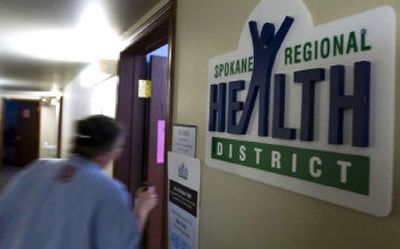Health district closing clinic in Valley

The Spokane Regional Health District is closing its one-day-a-week Spokane Valley clinic and expanding hours downtown. Officials say the move will save money and increase convenience for working people.
Shutting the clinic could save about $20,000 a year. It’s one of several cost-saving measures aimed at balancing a proposed $23 million 2007 health district budget that is up less than 1 percent over this year’s level.
Effective Oct. 30, the clinic closure will end immunization and testing services for an estimated 900 clients a year at the Broadway Avenue site in Spokane Valley, said Lyndia Vold, disease prevention and response director. Other services – such as the Women, Infants, and Children program – will continue.
The health district will expand early-morning and evening hours at the downtown clinic, a frequent request from clients who can’t make it during the day, Vold added.
“I don’t think it’s creating a gap at all,” she said.
But at least one client said the closure will create a hardship for Spokane Valley residents who don’t want to travel to the 1101 W. College Ave. clinic.
“I think they worry about driving downtown,” said Kitty Pirie, 60, of Spokane Valley, who stopped by the clinic for a flu shot Monday morning. “It’s too hard, especially with the bad weather coming up. I think location is really important.”
The Spokane Valley clinic’s costs have been almost twice as high as revenues, health district records indicate. Projected expenses for 2006 topped $20,000, while charges amounted to less than $11,000. About 80 clients a month used the clinic.
Shutting the site makes sense in a year when health district officials are counting on uncertain state funds for about $1 million in revenue, Administrator Torney Smith said Monday.
“You can see we’ve been squeezing blood from a turnip,” Smith said.
The district is guaranteed about $1 million in so-called backfill funds from the state Legislature through June 2007, the end of the current biennium.
Those were funds allocated after voters passed Initiative 695, which reduced the amount of motor vehicle fees that went to the state general fund.
Since 1999, the local health district has received about $2.1 million a year in backfill funds to replace about $2.4 million a year in lost motor vehicle fees. When this biennium ends, so will the guaranteed backfill funds, Smith said.
The state Joint Select Committee on Public Health Financing has been working on creating a stable source to replace and even increase that revenue, but it depends on legislative approval.
Smith said health district officials believe that the Legislature will come through.
“We’re balancing this based on historically what they have done,” he said.
“Otherwise, we’d have to cut $1 million from our budget.”
Reductions likely would come from staffing, which makes up the biggest proportion of health district costs. The health district board of directors will consider the proposed budget at a meeting Thursday.